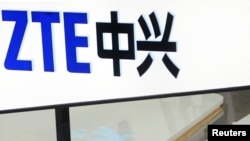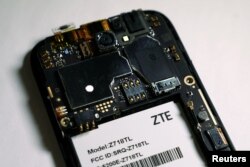The U.S. and China have reached a deal to lift sanctions against the giant Chinese ZTE telecommunications company that hobbled the firm when the United States banned the sale of American-made components it needed for its consumer products, U.S. Commerce Secretary Wilbur Ross said Thursday.
Ross told CNBC the accord will force ZTE, which employs nearly 75,000 workers, to pay a $1 billion fine for violating the U.S. ban on trade with North Korea and Iran, put another $400 million in escrow, and within 30 days replace its entire management and board.
Ross said going forward, the deal imposes the "most strict" compliance on ZTE. He said the penalties should serve as a very strong deterrent for "other potential bad actors" to force compliance with U.S. trade restrictions.
"If they do violate it again, in addition to the billion dollars they are paying us up front, we had them put $400 million in escrow," he said. "The total deal is $1.4 billion. That money will be forfeited if they violate anything ... and we still retain the power to shut them down again."
ZTE must hire a new compliance team selected by the U.S. Commerce Department for a 10-year term.
"We are literally embedding a compliance department of our choosing into the company to monitor it going forward," Ross said. "They will pay for those people, but the people will report to the new chairman."
"This is a pretty strict settlement," he added. "The strictest and largest settlement fine that has ever been brought by the Commerce Department against any violator of export controls."
The commerce secretary said he did not think the settlement of the ZTE dispute would have any impact on ongoing contentious trade and tariff talks between the U.S. and China, the world's two biggest economies.
Washington and Beijing have threatened each other with massive new tariffs on up to $150 billion of exports from the two countries, the fallout from the U.S. demand that China buy more American goods to sharply cut last year's $375 billion Chinese trade surplus with the U.S.
The ZTE agreement was reached after weeks of talks between U.S. and Chinese officials. The dispute stemmed from a U.S. decision to block sales of American-made components ZTE needs to manufacture its products for seven years, until 2025. The agreement calls for a 10-year suspended ban that can be activated if ZTE commits new trade violations.
Most of the world first heard of the dispute over ZTE nearly a month ago following a tweet by U.S. President Donald Trump.
Some U.S. lawmakers, both Republicans and Democrats, balked at Trump's effort to reach an accord on ZTE, saying that firm was a threat to U.S. national security through intelligence gathering on its devices. But Trump ignored the complaints, pushing Ross to settle the dispute.
Later Thursday, Republican Senator Marco Rubio of Florida said: "Huawei and ZTE pose a serious threat to America's national security. ... After today's decision to give #ZTE a pass, we have introduced a bipartisan amendment to restore penalties on ZTE."
Senate Minority Leader Chuck Schumer of New York said, "There is absolutely no good reason that ZTE should get a second chance and this decision marks a 180-degree turn away from the president's promise to be tough on China. ... It's up to Congress now to act to reverse the deal."
They both were part of a bipartisan effort behind the amendment.





